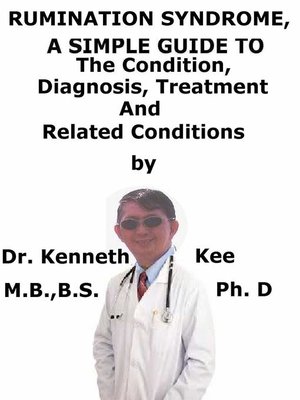Rumination Syndrome, a Simple Guide to the Condition, Diagnosis, Treatment and Related Conditions
ebook
By Kenneth Kee

Sign up to save your library
With an OverDrive account, you can save your favorite libraries for at-a-glance information about availability. Find out more about OverDrive accounts.
Find this title in Libby, the library reading app by OverDrive.



Search for a digital library with this title
Title found at these libraries:
| Loading... |
This book describes Rumination Syndrome, Diagnosis and Treatment and Related Diseases
Recently I had this patient who complained that she keeps bringing up food from the stomach into the mouth and re-chewing the food.
She was diagnosed by a gastroenterologist (intestinal specialist) as a classic case of gastro-esophageal reflux disease but did not improve with treatment.
She actually became worse after treatment with frequent vomiting and dehydration.
I suspected rumination syndrome after all the gastroscopy and blood results were found to be normal.
I put her on diaphragmatic breathing exercises and deep breathing exercises to help her relax.
She improved after 2 weeks of treatment.
Rumination syndrome is the disorder where people regurgitate and either spit out or re-swallows their food or drink soon after eating.
This can become worse or more frequent over time and can happen in anyone at age.
Rumination syndrome is the regurgitation of undigested food from the stomach back up into the mouth.
It is a reflex reaction, not a conscious decision.
Rumination disease is frequent in cows but it is not a normal part of digestion in humans.
This syndrome does happen in some otherwise healthy individuals.
In an affected patient, rumination normally happens for 1–2 hours after most meals.
It is a chronic disorder that normally happens after every meal, every day.
The state of rumination is more frequent in people who are pessimistic and who have negative attribution styles.
While the exact incidence of rumination is not known, due to a lack of good data, the syndrome is thought to be relatively rare.
It is not clear whether the incidence rate is actually increasing or doctors are just noticing the disorder more often.
Similar situations have happened in other functional gastrointestinal disorders.
Rumination syndrome happens in a category of GI disorders called functional gastrointestinal disorders (FGID).
As with any functional disorder, while no disease or physical abnormality is evident, the patient is suffering from very real disorders.
The disorder happens from dysregulation in the way the brain and the GI system communicate.
Other factors such as nerve sensitivity in the GI tract or psychological stressors can worsen the rumination symptoms.
Rumination syndrome most often begins after age 3 months, after a period of normal digestion.
It happens in infants and is rare in children and teenagers.
Certain disorders, such as lack of stimulation of the infant, neglect, and high-stress family situations, have been linked with the disease.
Rumination syndrome may also happen in adults.
Symptoms are:
1. Repeatedly bringing up (regurgitating) food
2. Repeatedly re-chewing food
3. Symptoms must go on for at least 1 month to fit the definition of rumination disorder.
4. People do not seem to be upset, retching, or disgusted when they bring up food.
The way to diagnosing rumination is taking a detailed history.
In the absence of a good history, there is an excellent chance that the diagnosis will be overlooked.
In the patient population, there are no known routine diagnostic tests of any value.
An esophago-gastroduodenoscopy may be done to exclude esophagitis
Rumination (tall R waves) can be observed in gastric manometry tracings in about 40% of patients.
Rumination syndrome is treated with behavioral treatment.
A treatment links bad results with rumination and good results with more suitable behavior (mild aversive training)
A behavioral psychologist teaches the method to patients,...






